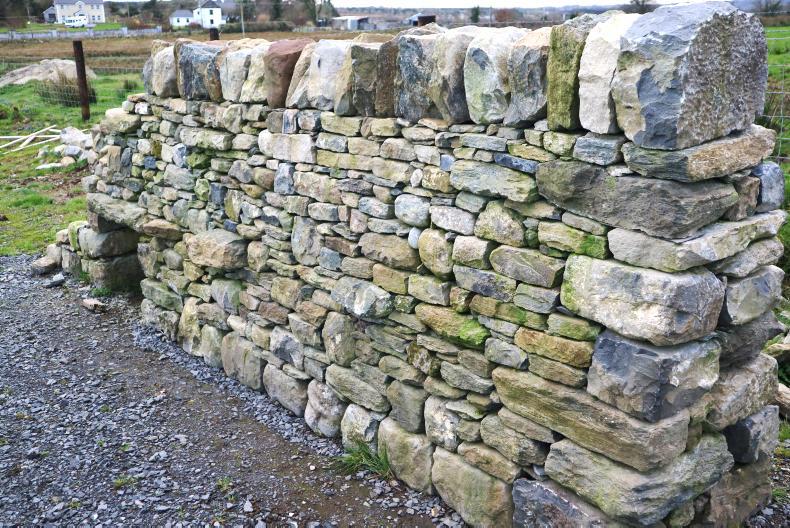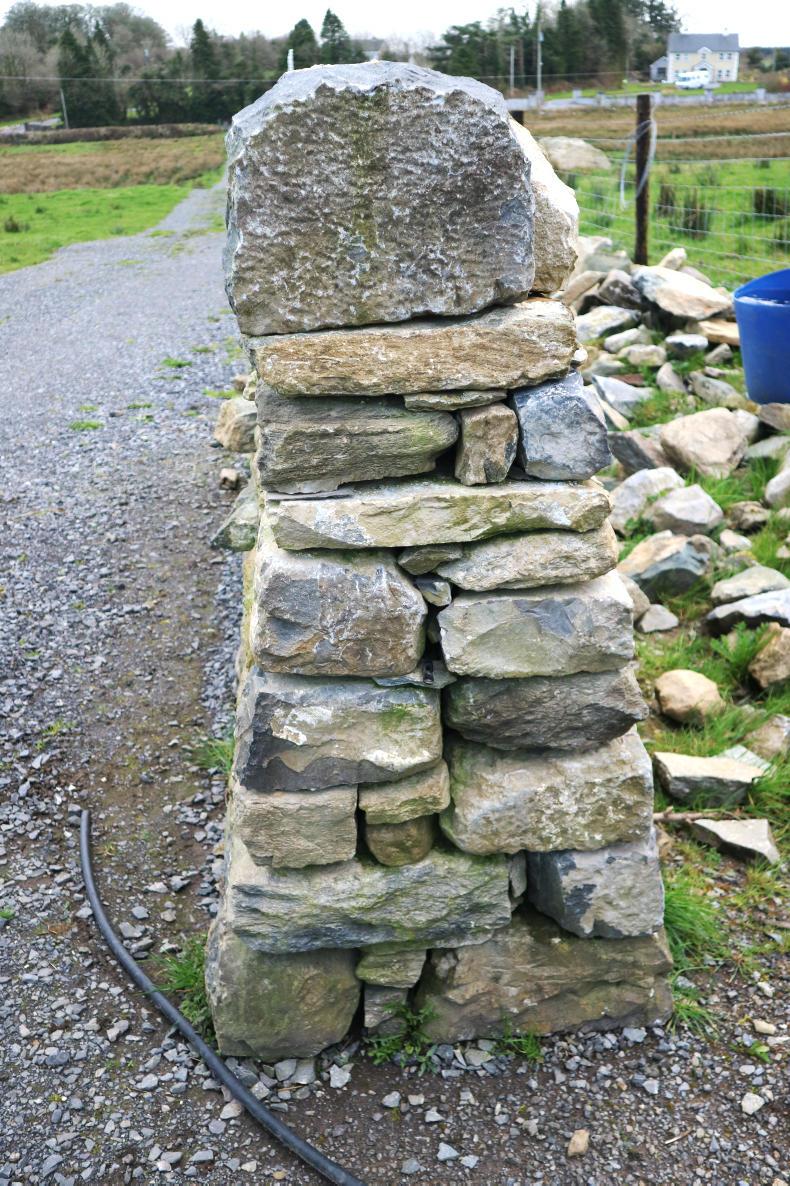One of the main reasons why the number of dry stone walls are in decline on farms is because the skill involved in repairing them has been lost. Many farmers would like to repair and maintain their walls but unfortunately do not know how to do it properly.
The Dry Stone Wall Association of Ireland (DSWAI) was set up in 2009. Its main aim was to create an awareness of the need for preserving the craft of dry stone building in Ireland.
The association has teamed up with the national organic training skillnet (NOTS) to provide training days in a number of locations around the country on dry stone walling. DSWAI says all abilities will be catered for. They claim that this will be an opportunity for farmers either interested in learning the basics of stone wall building or for more experienced farmers to advance their knowledge and improve their skills.
Why is dry stone walling important?
Louise Price, secretary of DSWAI, says dry stone walls are part of our national identity and make up the fabric of our countryside. She explained that dry stone wall building has been ongoing in Ireland for thousands of years. The earliest example of these walls date back to the Neolithic period (3000BC). The Céide Fields in Co Mayo are the oldest known field systems in the world. These dry stone walls are believed to be over 5,000 years old.
She believes that Ireland can become the stone wall Mecca of Europe and more can be done to make tourists aware of these assets.
Michael Fearnhead, a dry stone wall master craftsman, says existing walls on farms provide a number of advantages. They deliver a stock-proof fence that can last generations with routine maintenance and are a cheaper alternative to wire fencing which he says has a limited life expectancy. Walls also provide shelter for livestock and are particularly useful in the springtime for young lambs during periods of cold and wet weather.
A large number of farmers have chosen the maintenance of dry stone walls action on their GLAS plans, which is another reason to conserve walls. These farmers are incentivised to maintain their walls and repair any collapsed sections in the scheme.
What’s in the course?
Michael says the course will be very hands-on and will definitely not be presentations-based throughout.
“It will be very practical and the majority of the day will be based outside, working on walls,” he assured. The day will start out with some background to the concepts of dry stone wall building and this will be followed by a practical outdoor workshop.
“We will show people how to set out a wall, the use of profiles and lines and how to do general repairs,” explained Michael. After the course, participants should come away with the following:
A basic understanding of the skills involved in dry stone walling.A better awareness of the craft of dry stone building in Ireland. Training on how to maintain and repair your walls.The benefits of walls on the farm.Information on grants for walls. Farmers are asked to come with safety boots on the day. Gloves and safety goggles will be provided and any tools needed.
April 1 - Mc Evoy’s Quarry, Ballyknocken, Co Wicklow.April 8 – Cawleys Hotel, Tubbercurry, Co Sligo. April 22 – Mountcharles Community Centre, Mountcharles, Co Donegal.April 29 – We Sell Stone, Stone Mastery Academy, Roscrea, Co Tipperary.Possibility of a fifth workshop. Cost: NOTS is providing 25% funding for this course for employed or self-employed participants. The cost of the workshops will be €55 for eligible participants or €73.30 for non-members. Numbers will be limited so booking in advance is advised. Places can be booked on line via the NOTS website or call 071-964 0688.
Time: 10am - 5.30pm.
One of the main reasons why the number of dry stone walls are in decline on farms is because the skill involved in repairing them has been lost. Many farmers would like to repair and maintain their walls but unfortunately do not know how to do it properly.
The Dry Stone Wall Association of Ireland (DSWAI) was set up in 2009. Its main aim was to create an awareness of the need for preserving the craft of dry stone building in Ireland.
The association has teamed up with the national organic training skillnet (NOTS) to provide training days in a number of locations around the country on dry stone walling. DSWAI says all abilities will be catered for. They claim that this will be an opportunity for farmers either interested in learning the basics of stone wall building or for more experienced farmers to advance their knowledge and improve their skills.
Why is dry stone walling important?
Louise Price, secretary of DSWAI, says dry stone walls are part of our national identity and make up the fabric of our countryside. She explained that dry stone wall building has been ongoing in Ireland for thousands of years. The earliest example of these walls date back to the Neolithic period (3000BC). The Céide Fields in Co Mayo are the oldest known field systems in the world. These dry stone walls are believed to be over 5,000 years old.
She believes that Ireland can become the stone wall Mecca of Europe and more can be done to make tourists aware of these assets.
Michael Fearnhead, a dry stone wall master craftsman, says existing walls on farms provide a number of advantages. They deliver a stock-proof fence that can last generations with routine maintenance and are a cheaper alternative to wire fencing which he says has a limited life expectancy. Walls also provide shelter for livestock and are particularly useful in the springtime for young lambs during periods of cold and wet weather.
A large number of farmers have chosen the maintenance of dry stone walls action on their GLAS plans, which is another reason to conserve walls. These farmers are incentivised to maintain their walls and repair any collapsed sections in the scheme.
What’s in the course?
Michael says the course will be very hands-on and will definitely not be presentations-based throughout.
“It will be very practical and the majority of the day will be based outside, working on walls,” he assured. The day will start out with some background to the concepts of dry stone wall building and this will be followed by a practical outdoor workshop.
“We will show people how to set out a wall, the use of profiles and lines and how to do general repairs,” explained Michael. After the course, participants should come away with the following:
A basic understanding of the skills involved in dry stone walling.A better awareness of the craft of dry stone building in Ireland. Training on how to maintain and repair your walls.The benefits of walls on the farm.Information on grants for walls. Farmers are asked to come with safety boots on the day. Gloves and safety goggles will be provided and any tools needed.
April 1 - Mc Evoy’s Quarry, Ballyknocken, Co Wicklow.April 8 – Cawleys Hotel, Tubbercurry, Co Sligo. April 22 – Mountcharles Community Centre, Mountcharles, Co Donegal.April 29 – We Sell Stone, Stone Mastery Academy, Roscrea, Co Tipperary.Possibility of a fifth workshop. Cost: NOTS is providing 25% funding for this course for employed or self-employed participants. The cost of the workshops will be €55 for eligible participants or €73.30 for non-members. Numbers will be limited so booking in advance is advised. Places can be booked on line via the NOTS website or call 071-964 0688.
Time: 10am - 5.30pm.






 This is a subscriber-only article
This is a subscriber-only article







SHARING OPTIONS: